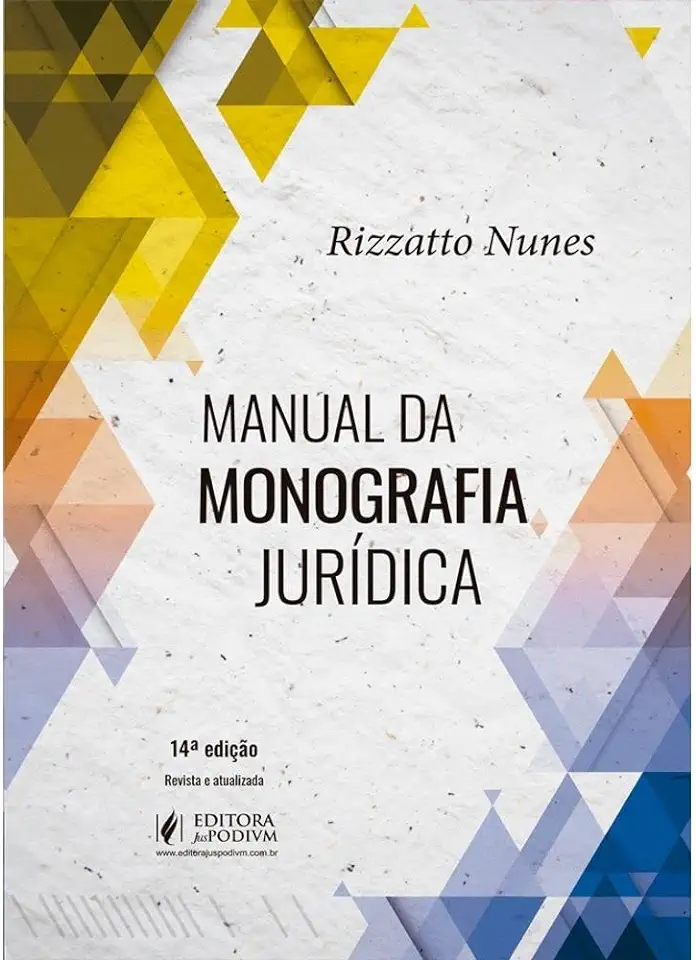
Legal Monograph Manual - Luiz Antonio Rizzatto Nunes
Legal Monograph Manual: A Comprehensive Guide to Writing and Publishing Legal Monographs
Introduction
The Legal Monograph Manual is an essential resource for anyone interested in writing and publishing legal monographs. Written by Luiz Antonio Rizzatto Nunes, a leading expert in legal research and writing, this comprehensive manual provides a step-by-step guide to the entire process, from choosing a topic to submitting your manuscript for publication.
Why Write a Legal Monograph?
Legal monographs are an important form of legal scholarship that allow authors to explore a specific legal topic in depth. They are often used to present new research findings, analyze complex legal issues, or provide a comprehensive overview of a particular area of law. Publishing a legal monograph can enhance your reputation as a legal scholar, increase your visibility in the legal community, and open up new opportunities for professional advancement.
Choosing a Topic
The first step in writing a legal monograph is choosing a topic. This is an important decision, as the success of your monograph will depend on your ability to find a topic that is both interesting and manageable. Nunes provides several helpful tips for choosing a topic, including:
- Start with your interests. What areas of law do you find most interesting? What topics are you passionate about?
- Do your research. Once you have a few potential topics in mind, do some research to see if there is a need for a monograph on that topic. Are there any gaps in the literature? Is there a new or emerging area of law that you could explore?
- Consider your audience. Who will be reading your monograph? What are their interests and needs?
Research and Writing
Once you have chosen a topic, it is time to start your research and writing. Nunes provides detailed guidance on both of these processes, including:
- Conducting legal research. How to find and evaluate legal sources, including primary and secondary sources.
- Organizing your research. How to create an outline and structure your monograph.
- Writing your manuscript. How to write clearly and concisely, and how to avoid common writing mistakes.
Editing and Revising
Before you submit your manuscript for publication, it is important to edit and revise it carefully. Nunes provides tips on how to:
- Proofread your manuscript. Check for typos, grammatical errors, and formatting issues.
- Get feedback from others. Ask colleagues, friends, or family members to read your manuscript and provide feedback.
- Revise your manuscript. Make any necessary changes to your manuscript based on the feedback you receive.
Submitting Your Manuscript for Publication
Once you are satisfied with your manuscript, it is time to submit it for publication. Nunes provides information on how to:
- Choose a publisher. There are many different publishers of legal monographs, so it is important to choose one that is reputable and has a good track record of publishing high-quality scholarship.
- Prepare your manuscript for submission. Follow the publisher's guidelines for submitting manuscripts, including formatting requirements and submission deadlines.
- Respond to the publisher's decision. If your manuscript is accepted for publication, you will need to work with the publisher to finalize the manuscript and prepare it for publication.
Conclusion
The Legal Monograph Manual is an invaluable resource for anyone interested in writing and publishing legal monographs. With its comprehensive guidance on every step of the process, from choosing a topic to submitting your manuscript for publication, this manual will help you to produce a high-quality monograph that will make a valuable contribution to the legal literature.
Order Your Copy Today!
The Legal Monograph Manual is available now from your favorite bookseller. Order your copy today and start your journey to becoming a published legal scholar!
Enjoyed the summary? Discover all the details and take your reading to the next level — [click here to view the book on Amazon!]